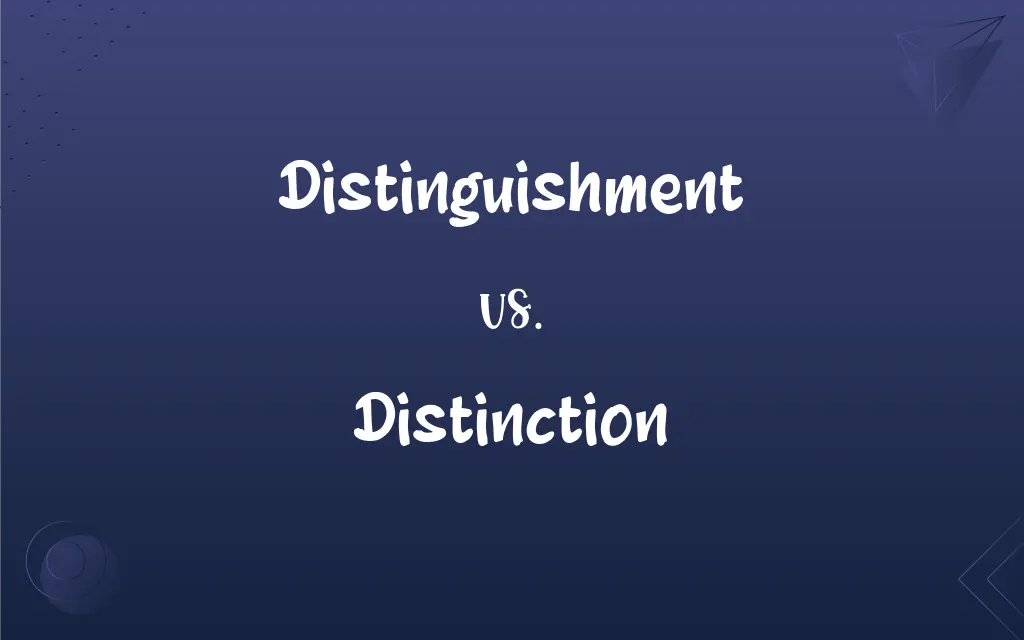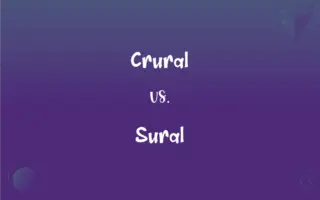Distinguishment vs. Distinction: What's the Difference?
Edited by Aimie Carlson || By Harlon Moss || Updated on November 7, 2023
Distinguishment is the act of being distinguished, while distinction is the state or condition of being distinguished.

Key Differences
Distinguishment refers to the process of making known the difference between two or more things, often implying an action. In contrast, distinction is the quality or condition that sets someone or something apart from others.
The word distinguishment is not as commonly used in modern English as distinction, which is widely recognized in contexts such as academia, where it denotes a level of excellence or honor.
Distinguishment can be seen as the action that leads to a state of distinction, which is a more permanent status or recognition of difference or excellence.
Distinction often carries a sense of prestige or honor, reflecting a positive differentiation, whereas distinguishment is a neutral term that merely indicates the differentiation process.
Both terms imply separation from the norm, but distinction is commonly used to describe notable achievements or characteristics, while distinguishment is the act of identifying those traits.
ADVERTISEMENT
Comparison Chart
Common Usage
Less common, action-oriented
Common, denotes quality or honor
Context
Process of differentiating
Result of being differentiated
Connotation
Neutral, simply implies differentiation
Often positive, associated with prestige
Temporality
Transitory, the act of distinguishing
Long-lasting, the state of being distinguished
Recognition
Does not imply recognition
Implies a high level of recognition or honor
ADVERTISEMENT
Distinguishment and Distinction Definitions
Distinguishment
The action of identifying distinguishing features.
The detective’s distinguishment of the evidence was crucial to the case.
Distinction
A characteristic that differentiates.
The distinction between the two species is subtle but crucial.
Distinguishment
The act of distinguishing.
The teacher's distinguishment between the two theories clarified the student's confusion.
Distinction
A differentiation between things.
The distinction between good and great is often hard work.
Distinguishment
The differentiation made between choices or options.
His distinguishment of the various options helped us make a better decision.
Distinction
A mark of honor or excellence.
She graduated with distinction from her university.
Distinguishment
An act that sets one apart from others.
His distinguishment in the field came from years of dedicated research.
Distinction
The state of being excellent or distinguished.
He achieved a high level of distinction in his academic career.
Distinguishment
The process of recognizing or noting differences.
Her ability for quick distinguishment of plant species is impressive.
Distinction
An award or honor for excellence.
The medal was a distinction for bravery.
Distinguishment
A distinction; observation of difference.
Distinction
The act of distinguishing; differentiation
Economists making an ongoing distinction between domestic and foreign markets.
Distinguishment
Observation of difference; distinction.
Distinction
The condition or fact of being dissimilar or distinct; difference
"the crucial distinction between education and indoctrination" (A. Bartlett Giamatti).
FAQs
How is distinction used in a sentence?
Distinction is often used to denote excellence, prestige, or a notable difference.
How is distinguishment used in a sentence?
Distinguishment is used to describe the process of differentiation, such as in identifying key features.
What does distinction mean?
Distinction refers to a state of honor or excellence that sets someone or something apart.
What might be referred to as a distinction?
Academic honors, clear differences, or unique traits can be referred to as distinctions.
Is distinction always positive?
Typically, distinction is positive, indicating honor or excellence.
Can an organization receive a distinguishment?
Typically, an organization might receive a distinction, while distinguishment refers to the act of differentiating it.
Are distinguishment and distinction interchangeable?
They are related but not interchangeable; one refers to an action, the other to a state or quality.
Can a person work towards a distinction?
Yes, people can work towards distinctions such as honors or awards.
Does distinguishment always lead to distinction?
Not necessarily; distinguishment is the act of differentiation, which may or may not lead to distinction.
What does distinguishment mean?
Distinguishment is the act or process of distinguishing or differentiating.
Is distinguishment a common term?
Distinguishment is not as commonly used as distinction in contemporary English.
What is a distinction in academics?
In academics, a distinction is a high honor denoting excellent performance.
How do you achieve distinction?
Distinction is achieved through notable excellence or difference in a particular field.
Can a product have a distinction?
Yes, a product can have a distinction if it is recognized for excellence.
Can a business have a distinction?
Yes, a business can have a distinction for its exceptional service or products.
How do cultural distinctions affect society?
Cultural distinctions contribute to the diversity and richness of a society.
Can distinguishment be a quality of a person?
Distinguishment is more of an action than a quality; the quality would be distinctiveness.
What is the role of distinguishment in critical thinking?
Distinguishment in critical thinking involves differentiating between ideas or arguments.
Is distinguishment important in education?
The ability to distinguish between concepts is important in education.
Can a negative feature be a distinction?
Yes, if it notably sets someone or something apart, though it's not usually referred to as such.
About Author
Written by
Harlon MossHarlon is a seasoned quality moderator and accomplished content writer for Difference Wiki. An alumnus of the prestigious University of California, he earned his degree in Computer Science. Leveraging his academic background, Harlon brings a meticulous and informed perspective to his work, ensuring content accuracy and excellence.
Edited by
Aimie CarlsonAimie Carlson, holding a master's degree in English literature, is a fervent English language enthusiast. She lends her writing talents to Difference Wiki, a prominent website that specializes in comparisons, offering readers insightful analyses that both captivate and inform.































































